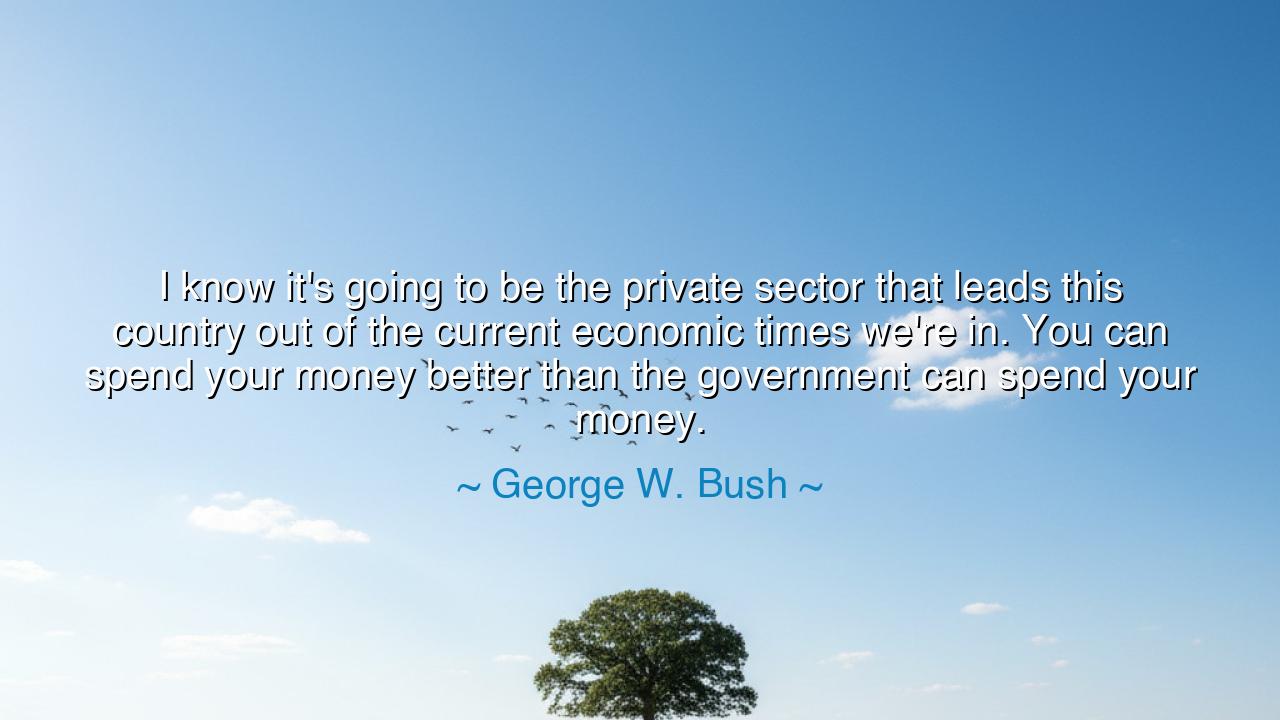
I know it's going to be the private sector that leads this
I know it's going to be the private sector that leads this country out of the current economic times we're in. You can spend your money better than the government can spend your money.






The words of George W. Bush — “I know it's going to be the private sector that leads this country out of the current economic times we're in. You can spend your money better than the government can spend your money.” — speak with the steady conviction of one who believes in the power of the individual over the machinery of the state. In these words burns the ancient truth that prosperity springs not from decree, but from the labor, vision, and courage of free people. They are the echo of a principle older than any modern nation: that the strength of a society lies not in its rulers, but in its citizens — in their capacity to build, to create, to dream, and to act.
The origin of this quote lies in the early years of the twenty-first century, a time when America stood upon the trembling ground of economic uncertainty. The nation faced recession, financial turmoil, and the question that has haunted every democracy — how much should the government do, and how much should it trust its people to do for themselves? President Bush, shaped by the long tradition of American individualism, gave his answer with simplicity and faith. To him, the private sector — the farmers, merchants, inventors, and entrepreneurs — were not mere cogs in the nation’s wheel, but the wheel itself, the driving force that carried the republic forward.
To say that “you can spend your money better than the government can” is not a call to selfishness, but a defense of responsibility and wisdom. For when the fruits of labor remain in the hands of those who earn them, they are used with care, foresight, and creativity. The worker who saves, the craftsman who invests in his trade, the mother who builds a home, the businessman who risks capital for innovation — each becomes a steward of progress. But when wealth flows upward into the vast machinery of government, it is too often scattered in inefficiency, burdened by bureaucracy, and dulled by distance from the human heart. Bush’s words remind us that the closer a dollar remains to the hands that earned it, the more power it has to do good.
History offers countless mirrors to this truth. Consider the tale of postwar America after the Second World War. The nation emerged weary yet alive with potential. Rather than relying solely on government command, it turned to its citizens — the workers who rebuilt factories, the veterans who used the G.I. Bill to educate themselves, and the entrepreneurs who dared to create industries from steel, oil, and silicon. The result was one of the greatest economic expansions in human history. From humble garages and workshops rose companies that transformed the world — proof that innovation and growth are born not in the halls of government, but in the freedom of enterprise.
Yet Bush’s words also carry a warning. For when the people grow dependent upon the state to provide what their own hands could build, they surrender not only their wealth but their dignity. The government, though created to protect and serve, is ever tempted to expand its reach. What begins as assistance can become control; what begins as protection can become paternalism. In this lies the danger that Bush sought to guard against — that a nation of free citizens might become a nation of petitioners, waiting upon the benevolence of the state rather than the strength of their own will.
But the lesson here is not to despise government, for Bush did not speak in rebellion but in balance. Government has its place — to defend, to uphold justice, to ensure fairness. Yet beyond that, the sacred work of building a nation belongs to the people themselves. The farmer’s plow, the teacher’s mind, the craftsman’s hands — these are the true engines of progress. A wise government must, therefore, do what is necessary to preserve freedom, and then step aside, allowing the energy of its citizens to flourish.
The message to future generations is clear: Freedom and responsibility are twins — one cannot live without the other. To believe that you can spend your money better than the government is to believe that your choices matter, that your effort bears meaning, and that prosperity is not granted, but earned. Each person must learn to be a good steward of what they possess, using their labor not for greed but for the common good. For when every citizen acts with integrity and initiative, the whole nation rises with them.
So let these words be a call to action: work diligently, give wisely, build boldly, and guard your freedom fiercely. Trust in your own capacity to create value, and in the unseen strength of countless others doing the same. For it is not governments that make a people great, but the people themselves — united in purpose, yet free in action. Thus spoke George W. Bush, echoing the wisdom of ages: that the greatest wealth of a nation is not in its treasury, but in the hearts, minds, and hands of its free and industrious citizens.






AAdministratorAdministrator
Welcome, honored guests. Please leave a comment, we will respond soon